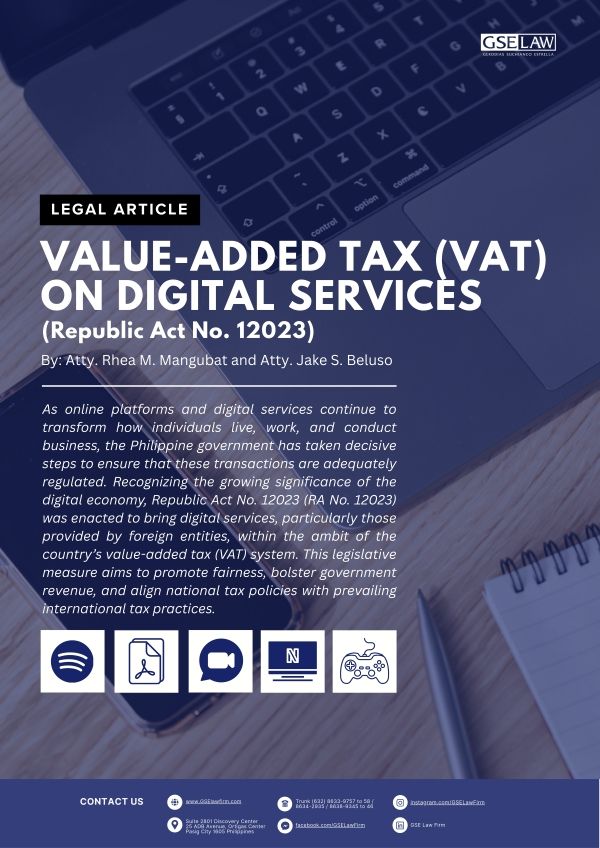
Value Added Tax on Digital Services (Republic Act No. 12023)By: Atty. Rhea M. Mangubat and Atty. Jake S. Beluso
As online platforms and digital services continue to transform how individuals live, work, and conduct business, the Philippine government has taken decisive steps to ensure that these transactions are adequately regulated. Recognizing the growing significance of the digital economy, Republic Act No. 12023 (RA No. 12023) was enacted to bring digital services, particularly those provided by foreign entities, within the ambit of the country’s value-added tax (VAT) system. This legislative measure aims to promote fairness, bolster government revenue, and align national tax policies with prevailing international tax practices.
Globally, there has been a marked shift toward the taxation of digital services. Many jurisdictions, particularly within the ASEAN region, have already implemented VAT or similar consumption taxes on digital services as early as January 2020. Nations like Indonesia, Malaysia, Singapore, and Thailand now require foreign digital service providers to register for local VAT, collect taxes from users, and remit these to the host government.[1] This trend stems from the rapid growth of cross-border digital commerce and the need to ensure that these activities contribute to public revenue in the jurisdictions where services are consumed. For the Philippines, adopting VAT on digital services helps prevent tax losses and ensures that foreign entities do not gain an unfair advantage over domestic providers who are already VAT-registered.
RA No. 12023 defines digital service as any service that is supplied over the internet or other electronic network with the use of information technology and where the supply of the services is essentially automated. Examples of digital services include online search engine, online marketplace or e-marketplace, cloud service, online media and advertising, online platform, or digital goods. The law makes it clear that both resident (Philippine-based) and non-resident (foreign) digital service providers are subject to 12% VAT if their digital services are used or consumed within the Philippines.[2]
A nonresident digital service provider refers to a digital service provider that has no physical presence in the Philippines. Such service provider is required to register with the Bureau of Internal Revenue (BIR) through the VAT on Digital Service Portal.[3] The law grants the BIR Commissioner the power to block digital services performed or rendered in the Philippines by digital service providers for failure to comply with the registration requirements.[4]
A nonresident digital service provider is liable for the electronic filing of the VAT return and the remittance of VAT on the digital services that are consumed within the Philippines if the consumers are non-VAT registered. Conversely, in cases where a Philippine VAT-registered taxpayer purchases digital services from a nonresident digital service provider, the former is liable for the electronic filing of the remittance return and for withholding and remitting the VAT to BIR under the reverse charge mechanism in digital service.[5]
Further, if a VAT-registered nonresident digital service provider is classified as an online marketplace or e-marketplace, it shall also be liable to remit the VAT on the transactions of nonresident sellers that go through its platform.[6] However, nonresident digital service providers are not allowed to claim creditable input tax.[7]
The law also provides for VAT-exempt digital service transactions. Educational services delivered through online platforms, for instance, are exempt if they are rendered by institutions accredited by the Department of Education, CHED, or TESDA. Financial services conducted through digital channels, as long as they fall under traditional exemptions, are likewise not subject to VAT. These exemptions aim to preserve accessibility to essential services while focusing taxation on commercial digital activities.[8]
The introduction of VAT on digital services carries both opportunities and challenges. On the positive side, it is expected to boost government revenues by capturing taxes from a rapidly growing sector of the economy. It also creates a more equitable environment by ensuring that nonresident digital service providers comply with the same tax obligations as resident digital service providers. Furthermore, the law supports long-term development by allocating a portion of the revenues to creative industries, fostering innovation and cultural growth.
However, implementation may not be without complications. Nonresident digital service providers may struggle with compliance due to unfamiliarity with Philippine tax procedures, language barriers, technical issues in registration and reporting and absence of physical presence in the Philippines. From a consumer perspective, there is a significant possibility that service costs could increase, as providers will most likely pass on the VAT to the consumers. For tax administrators, enforcing cross-border compliance and distinguishing between taxable and exempt digital services will require new systems, clearer guidelines, and effective inter-agency coordination.
In summary, RA No. 12023 is a timely response to the changing landscape of global commerce. By extending VAT to digital services, the Philippines is closing a critical gap in its tax system, ensuring revenue integrity, and promoting fair competition. While the road to full implementation will require careful coordination and capacity building, this law lays the groundwork for a more inclusive, modern, and resilient tax structure in the digital age.
The authors are from GSE Law’s Tax Practice Group.

Atty. Rhea Mangubat, a Certified Public Accountant (CPA) and Lawyer, is an incumbent director of the Tax Management Association of the Philippines and has almost two decades worth of experience in tax practice, specializing in tax audits, assessments, corporate tax structuring, tax treaty relief applications, tax advisory and compliance, and estate tax planning.

Atty. Jake S. Beluso is also a CPA-Lawyer, and ranked 4th overall in University of San Carlos – Juris Doctor Program Batch of 2023.
______________________________________________________________
- https://www.aseanbriefing.com/news/philippines-introduces-new-vat-policy-on-foreign-digital-services-starting-july-2024/ ↩︎
- Section 3 – Republic Act No. 12023 ↩︎
- Section 5(b) – Revenue Regulation No. 03-2025 ↩︎
- Section 9 – Republic Act No. 12023 ↩︎
- Section 8 – Republic Act No. 12023 ↩︎
- Section 4 – Republic Act No. 12023 ↩︎
- Section 6 – Republic Act No. 12023 ↩︎
- Section 5 – Republic Act No. 12023 ↩︎